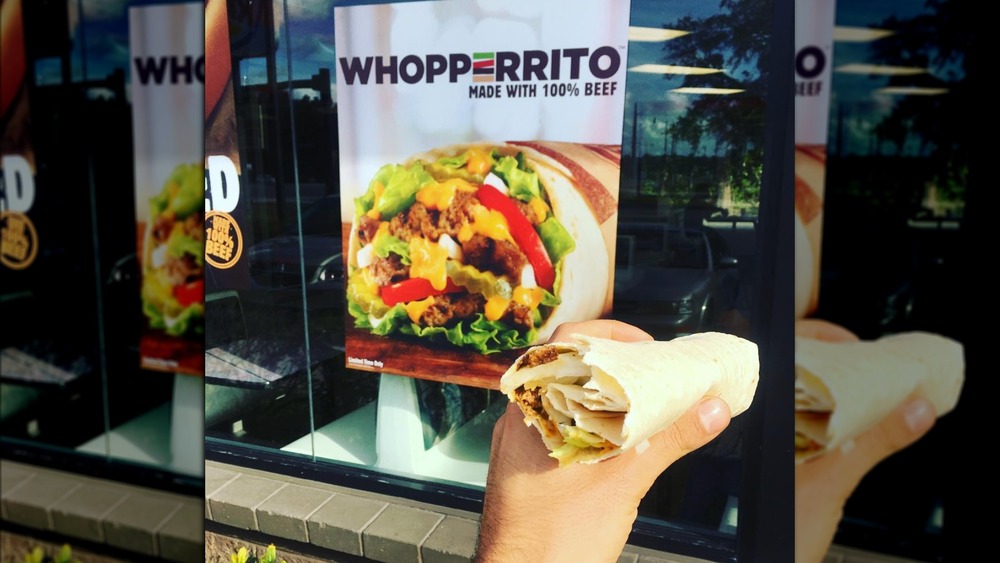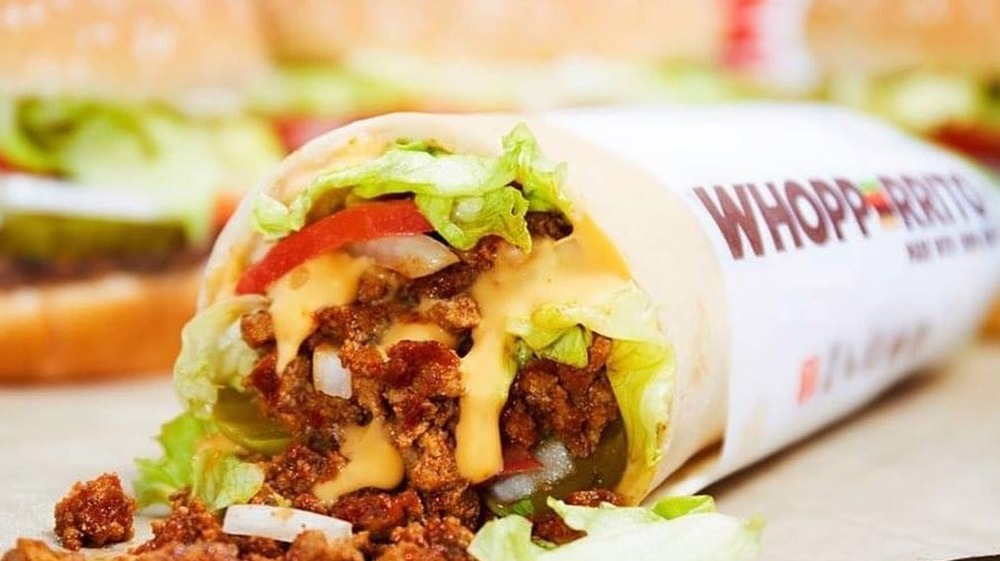The Real Reason People Stopped Buying Burger King's Whopperrito
The Whopperrito was never supposed to become the laughing stock of social media. And by that we mean, it was never supposed to go national. Eater caught wind of it in the early summer of 2016, when the bits of crumbled burger, ensconced in a burrito bun and held together with nacho cheese, were being served up in the small town of Hermitage, Pennsylvania, population 15,471 (via United States Census ). At the time, a Burger King spokesperson assured the media outlet that, "There are no plans to introduce the Whopperrito nationally."
Not releasing was a solid course of action, while it lasted. When Stephen Colbert caught a whiff of the Whopperrito in Hermitage, he had a field day (via YouTube). Colbert called the fast-food novelty, "great if you love both of [burritos and burgers] and hate yourself" before using Burger King's attempt at a burrito to transition into a withering criticism of then-presidential candidate, Donald Trump (category: things that aren't "going to have a lot of Hispanic fans," according to Colbert).
But sometime between June 2016 and August 2016, things shifted for Burger King's national decision-makers. In August, Newsweek announced the Whopperrito's nation-wide, limited-edition debut. Days later, Oreo stole BK's thunder by coming out with Swedish Fish-flavored cream (via USA Today).
Why Burger King risked so much on the Whopperrito
Publicity surrounding Burger King's Whopperrito didn't get much better than Colbert's. "The Whopperrito lives in a melancholy twilight between two types of food," wrote Mass Live, labeling Burger King the "fast-food chain trying the hardest to be weird." Vice's reviewer scoffed that "It didn't need the sandwich to reconstitute itself as international ethnic food in order to make me like it." One Instagrammer wrote, "They're trying to kill us," while another posted, "There aren't words to fully express how horrible it truly was."
What happened next, seems in hindsight, to have been 101 percent predictable and preventable. Burger King's same-store sales in North America dropped during the third quarter, something The Street blamed on the Whopperrito, and how much people disliked it. The same media outlet noted that a year prior, the fast-food chain's sales had grown by 5.2 percent.
The real question, then, is not why people stopped buying Burger King's Whopperrito (nobody liked it, sales dropped, and then Burger King took it off the menu). The real question is: what drove Burger King to make such a reckless decision, and put the Whopperrito on the national market in the first place?
Burger King's North American President Alex Macedo told Newsweek at the time that the company was trying to tap into "the Tex-Mex category." Perhaps The King was simply looking for a market opening. And when, as Consumerist pointed out, Chipotle's food started inadvertently making its customers sick, Burger King pounced on the news. Maybe that's what happened. We think The King was playing another game entirely.
Believe it or not, The Whopperrito lives on
We'll hand the mic back to Vice's Whopperrito expert, Nick Gazin, who called it. "I don't think this was an earnest food invention," Gazin wrote, "I think this is stunt-burgerism created to get press and hashtags." Ding Dong. Because while the Whopperrito doesn't exist on Burger King's physical menu anymore, it certainly lives on in the minds of those who tried it, those who watched other people try it, or those who, to this day, dig up social media records of people talking about people trying it (via Eat This, Not That).
On Twitter, the Whopperrito has become a generational "remember when" reference. The Whopperrito is also now ingrained enough in our popular culture to occupy the coveted linguistic function of the hip, cultural analogy. Case in point: "The folks you see in vids, throwing fits about masks or acting like maniacs, these are not usual people. They're like this Whopperrito. It's sort of a burrito, which is good, but it's perverse & bad," tweeted @IanFortey. Whopperritos have become infamous enough in our historical culinary lore that other companies name-drop the Whopperrito to troll Burger King (via Twitter). Finally, Whopperrito's have amassed a small-cult following of copycat Whopperrito-makers who attempt to create homemade versions of the phenomenon (via Instagram).
People might have stopped buying Burger King's Whopperrito. But Burger King didn't lose this one. The hamburger-burrito hybrid is very much alive. And, if you really, truly, want one, Burger King will still make one for you. Ask for a tortilla instead of a bun with your burger, according to one Reddit user.


